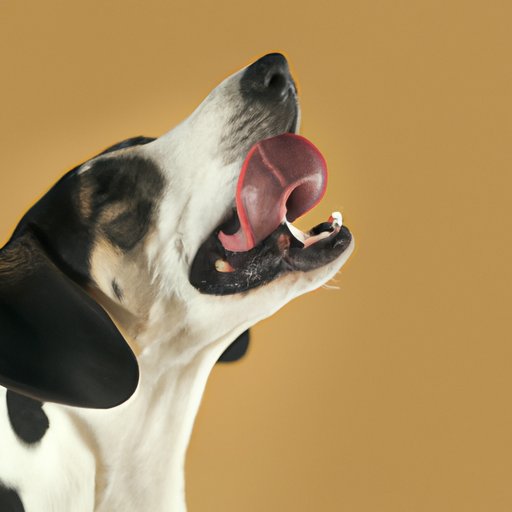Introduction
Dog owners may have noticed their furry friend frequently licking their lips for seemingly no reason. However, this behavior is not as random as it may seem. Understanding why dogs lick their lips is crucial for owners in order to better communicate and care for their pet.
Exploring the Different Meanings Behind Dog Lip Licking Behavior
Dogs may lick their lips for a variety of reasons, and it is important for owners to understand these differences in order to accurately interpret their pet’s behavior. Some common reasons include:
Anxiety or Stress
Just like humans, dogs may experience anxiety or stress in certain situations such as during a thunderstorm, fireworks, or when they are left alone for an extended period of time. In these cases, lip licking may be a sign of their discomfort.
Nausea
Lip licking can also be an indication of physical discomfort. Dogs may lick their lips to alleviate nausea or other digestive issues.
Communication
Dogs also use lip licking as a form of communication. It can be a way to show deference or appeasement to other dogs or humans in their environment.
Other Potential Reasons
In some cases, lip licking could signify other health issues such as dental problems or allergies, or it can be a self-soothing behavior for dogs.
It is important to note that lip licking does not necessarily indicate one specific cause. Rather, it is a behavior that owners should observe in conjunction with other behaviors and situations in order to accurately determine the underlying cause.
Understanding the Science of Dog Lip Licking
Physiologically, dogs lick their lips to help stimulate the production of saliva. This can help with digestion and alleviate dryness in the mouth. Neurologically, lip licking can also stimulate the brain’s pleasure centers, providing relief from anxiety or stress.
From an evolutionary perspective, lip licking can be traced back to the times when dogs were wild animals and would hunt for their own food. Licking their lips would help remove any remaining scents and tastes from their prey that could alert other animals to their presence.
Common Misconceptions About Dog Lip Licking
There are several misconceptions surrounding the behavior of dog lip licking. Two of the most common misconceptions are:
Not Always a Sign of Affection
Many people assume that when a dog licks their lips, it is a sign of affection towards the owner or another dog. However, this is not always the case.
Not Always a Negative Behavior
Some people associate lip licking with negative emotions such as fear or anxiety. However, as previously mentioned, it can also be a form of communication or a self-soothing behavior for dogs.
It is important for owners to recognize that behaviors have multiple meanings and to observe other behaviors in conjunction with lip licking in order to accurately determine the cause.
Analyzing Lip Licking Through the Lens of Dog Psychology
Through observation and analysis of a dog’s lip licking behavior, it is possible to gain insight into their emotional state. Lip licking combined with other behaviors such as yawning, panting, or avoidance can indicate stress or anxiety. Alternatively, lip licking that is brief and accompanied by tail wagging or relaxed body language may indicate appeasement or a desire to communicate with their human or other dogs in their environment.
It is important to observe more than just one behavior to get a complete picture of a dog’s emotional state and make decisions regarding their care and behavior.
Expert Tips for Managing Dog Lip Licking
If owners suspect that their dog’s lip licking behavior may be due to a health concern, it is important to consult with a veterinarian to rule out any underlying issues. If the behavior is related to anxiety or stress, there are several management techniques that can be utilized:
- Providing a safe and secure environment for the dog.
- Regular exercise to alleviate anxiety and promote relaxation.
- Dog training courses to help dogs learn how to deal with stressful situations.
- Use of calming supplements or medications as prescribed by veterinarians.
It is important to note that every dog is different, and what works for one may not work for another. Consistency and patience are key when working with any dog behavior issue, and consulting with an animal behaviorist or trainer may be beneficial.
Conclusion
To sum up, dog lip licking is a common behavior that has multiple potential meanings and should not be taken at face value. Owners should observe other behaviors and situations in conjunction with lip licking to accurately determine the underlying cause, and work with an expert to manage the behavior if necessary. Understanding dog behavior is crucial for better communication and care, ensuring that dogs and their owners can form strong bonds.
